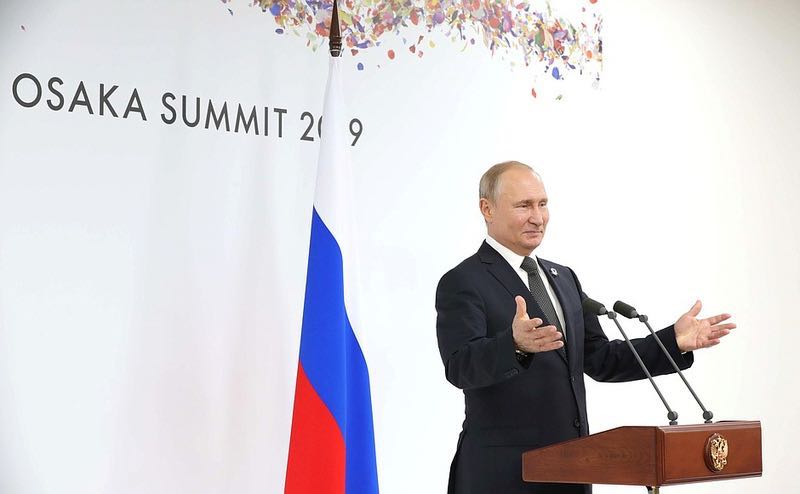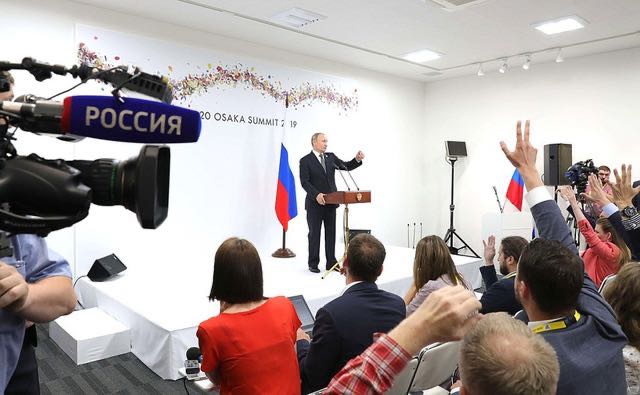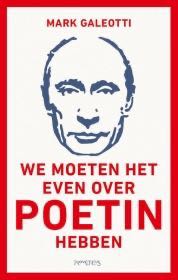In his interview with the Financial Times Vladimir Putin buried liberalism. Commentators fumed, but our columnist Mark Galeotti, author of the sobre book We need to talk about Putin, puts things in perspective. Putin is a man with many masks, who easily adapts to different audiences. His main goal is stability for his regime and for the world, in the interest of Russia. And of his business friends.
P Putin at the pressconference after the G20 summit in Osaka (pictures Kremlin.ru)
Putin at the pressconference after the G20 summit in Osaka (pictures Kremlin.ru)
Vladimir Putin certainly made waves in the West with his recent extended interview in the Financial Times. Liberalism was dead, he proclaimed. Cue the inevitable fury and furore, but this was not a manifesto for a new illiberalism. Putin is not Tsar Nicholas I, appointing himself gendarme of Europe in the name of 'Orthodoxy, Autocracy and Nationality'. Rather, he is an old-style pragmatist trying to appeal to different constituencies, while having a little fun at the West’s expense.
First of all, let us recognise that the trollmaster-in-chief was in the house. He took a sideswipe at the British political process, for example, whereby some 160,000 members of the Conservative Party are about to choose the next prime minister of a country of 66 million souls ('In your country, one leader has left, and the second leader… is not elected by a direct vote of the people, but by the ruling party. It is different in Russia, as we are a democratic country').
Likewise, he steered clear of any full-throated declaration of support for Trump and his 'unusual methods', noting that 'I do not accept many of his methods when it comes to addressing problems. But… I think that he is a talented person. He knows very well what his voters expect from him.' Is this 'talented' as a leader, or simply as a crowd-pleasing entertainer?
Liberalism is dead?
But the section of this interview which attracted the most attention was when he turned to 'the so-called liberal idea, which has outlived its purpose'. Raising the usual spectres of uncontrolled migration, disappearing gender distinctions, and efforts to undermine religion, he asserted that 'the liberal idea has become obsolete. It has come into conflict with the interests of the overwhelming majority of the population'.
What does this actually mean, though? His targets were predictable ones, reflecting the usual Russian state line that the West is drowning in dissolute decadence, adrift without a moral compass. Europe is 'Gayropa', a continent lost in fashionable degeneracy. Canada most recently emerged as the unlikely source of sinister 'narcoliberals' seeking to promote global drug use, according to a speech by foreign intelligence chief Sergei Naryshkin that himself verged on the hallucinogenic. The USA gets a more circumspect treatment so as not to alienate the Donald, but critics of his migration policy were caricatured as turning a blind eye to rape and plunder.
While it is easy to portray Putin’s Russia as a bastion of social conservatism, this is at best another caricature. Despite his own authoritarian position, and the reprehensible recent rollbacks on legal constraints on domestic violence and legal rights for the LGBT+, Russia is still liberal in many ways. Putin is actually a liberal in certain classic ways. He has made clear his continued support for abortion rights – over the protests of many within the Russian Orthodox Church – and while he may claim that 'Russia is an Orthodox Christian nation', it is also a Moslem one. His rhetoric to Al Jazeera or Tatarstan’s Kazanskie vedemosti or conversations with Ramzan Kadyrov will be rather different. Although there has been a creeping and covert renationalisation of the economy, in broad terms he is a proponent of market economics. While TV is essentially state-controlled or -influenced, and individual outlets or journalists will face trouble if they cross certain red lines, there is still media plurality and considerable freedom, too. In crude terms, Putin only represses or restricts when he feels he must, not because that is his end goal.
 Putin in Osaka (picture Kremlin.ru)
Putin in Osaka (picture Kremlin.ru)
Likewise, whereas for some Russia also stands as an enemy of 'globalisation', Putin spoke out in favour of it. The Kremlin is opposed to certain forms and aspects of it, forms that, not without some justice, it feels were set by the West and in the West’s interests. Beyond that, though, Russia is no hermit kingdom, no Muscovite North Korea. It is deeply and arguably inextricably linked with the global economy, as well as in the same informational, cultural and intellectual spheres as the West.
'Putinism' is about a style of rule and some broad understanding about how the world works and what Russia’s place within it ought to be. It is not an ideology in any meaningful sense. The Eurasianist Alexander Dugin, the prolific statist parliamentarian Alexander Khinshtein, the White Russian writer Ivan Ilyin, the technicolour political technologist Vladislav Surkov: none of these offer a philosophical guide to 'Putinism'. At best, they occasionally provide a convenient intellectual rationale, such as the way Dugin was briefly brought to the fore in 2014 when his ideas could be paraded in support of policy in the Donbas, and then as quickly dropped back into relative obscurity when the Kremlin line moved in response to practical exigencies.
The man of many masks
It is always striking how many hardened commentators and cynical journalists who wouldn’t believe it was sunny when their own politicians tell them, without sticking a head out of the window to double-check, nonetheless take Putin at face value. Rather, what this exegesis demonstrates is not what motivates Putin so much as his assumptions about what motivates other people.
His statements about liberalism were squarely intended to appeal to the social conservatives in the West who represent one of the Kremlin’s key constituencies these days, the Bannonites and Brexiteers, the Salvinis and Orbans. Crude stereotypes of migrant hordes and trans rights, issues of no real perceived relevance to Russia, are central to their defensive and laagered view of the world.
One of Putin’s great strengths is, after all, to be able to wear so many masks. To Russians he can play the 'good tsar', the national champion, or the details-oriented chief executive. To Western conservatives, he is one of them (America’s National Rifle Association may fete him, but Russia has tight gun control laws), while to old-style leftists he is the sole bulwark against Washington’s global hegemony.
We saw three familiar masks in this speech. There was Putin the veteran leader mocking the failures and foibles of his here-today-gone-tomorrow democratic counterparts.
There was the hard-driving chief executive, stressing that Russia was open for business. Even in his response to gentle questioning about the Skripal case, which he dismissed as 'all this fuss about spies and counter-spies… is not worth five kopecks'. Rather, it was time to 'develop our ties normally and support business people, who are doing what? They do not only earn money…. They create jobs and added value, plus they provide revenue at all levels of the tax system of their countries.'
Clearly, he has put much of his hopes for 'normalisation' – Kremlinspeak for an end to sanctions and a return of Russia to the top table of geopolitical players without prejudice or limitations – in business opportunities. He may prove right, not least if Brexit leads to economic hardship in the UK and if southern European economies continue to founder. Money doesn’t only talk, it also votes.
Putin the conservative
Putin may be relatively socially liberal, but he is a conservative in power terms. This is another way in which he actually is worlds apart from many of his Western fanboys, who are social conservatives and political radicals.
The third mask is not of master of discord, but Putin the advocate of stability. A key line in this interview was when he talked about how important it was to 'be able to avoid major political upheavals and troubles'. His resistance to global norms and even international law is as much as anything else because he sees these as potential drivers of regime change.
Time and again in his interview, he painted a picture in which trying to exclude Russia or simply maintaining policies designed to punish and constrain it, risked leading to chaos. Overall, he warned that 'the "global" situation has definitely become more dramatic and explosive'. On North Korea, 'the current situation is fraught with unpredictable scenarios, which we must avoid'. His main critique of attempts to topple Maduro in Venezuela were not about the (limited) virtues of the regime, but that, regardless of the qualities of opposition figure Juan Guaido, 'when a person enters a square, raises his eyes to the sky and proclaims himself president', then such tactics cannot be allowed to work, or 'this will cause chaos all over the world'.
With some very specific exceptions relating to the countries he sees as within Moscow’s legitimate sphere of influence – most notably Ukraine – Putin has demonstrated himself willing to work with any standing government, from Saudi Islamo-monarchy to Chinese state capitalist, to Western democracy. His statements on Venezuela were telling; given an opportunity to defend Caracas, he simply said that Russia had interests there like many others, and 'we worked with President Chavez because he was president'. No praise, just a recognition that you talk to whoever is in the chair.
Even in his defence of globalisation, he expressed his concerns at the extent that the uneven distribution of its fruits is a source of instability, as 'the ruling elites have broken away from the people. The obvious problem is the gap between the interests of the elites and the overwhelming majority of the people'. Putting aside the obvious irony that this comes from a man who has presided over a growing wealth gap and the rise of a kleptocratic cabal of cronies, it is otherwise an acute observation of what has happened, not least in America where 'The middle class… has not benefited from globalisation; it was left out when this pie was divided up'. The implication, although one undoubtedly going over the Donald’s head, is that his election is a by-product of the very chaos Putin is warning against.
His Kremlin is delighted to take tactical advantage of chaos to undermine the West, to be sure. Factional rows, secessionist movements, questions over systemic legitimacy: all of these provide fracture lines that Moscow seeks to open. But only up to a point. What Putin does not want is anarchy.
An expanding NATO and EU are problems, for example, because that means change – but if they were to collapse, there is also a keen awareness that with them would disappear constraints on such countries as Germany and Poland, that Moscow considers potential rivals and threats, respectively. The global international order is perhaps a Western construct, but were there no such order, then what would constrain a rising China on Russia’s long, hard to defend border?
Stability – in the main – is Putin’s watchword. It is what he hopes will continue to legitimise his regime with the Russian people, and also what he hopes ultimately will win over the West: 'How long will Russia remain a stable country? The longer the better. Because very many other things and its position in the world depend on stability, on internal political stability'. In other words, he’s telling the West that things could be much, much worse, so they should settle for the Russia they have. It’s not liberalism he wants to see dead, but optimism.


Mark Galeotti's book 'We Need to Talk about Putin' now has been translated to Dutch: 'We moeten het even over Poetin hebben' (publisher Prometheus)
